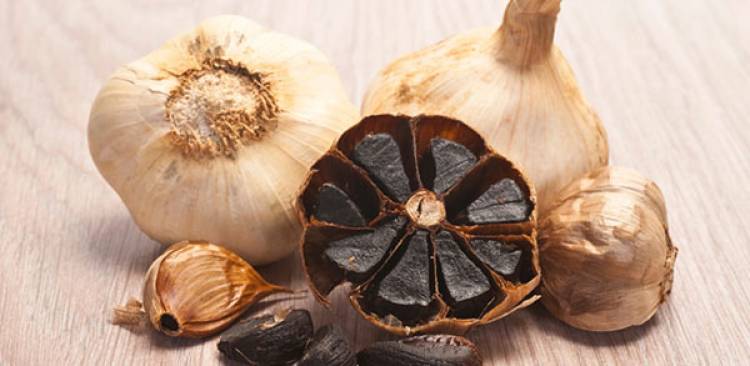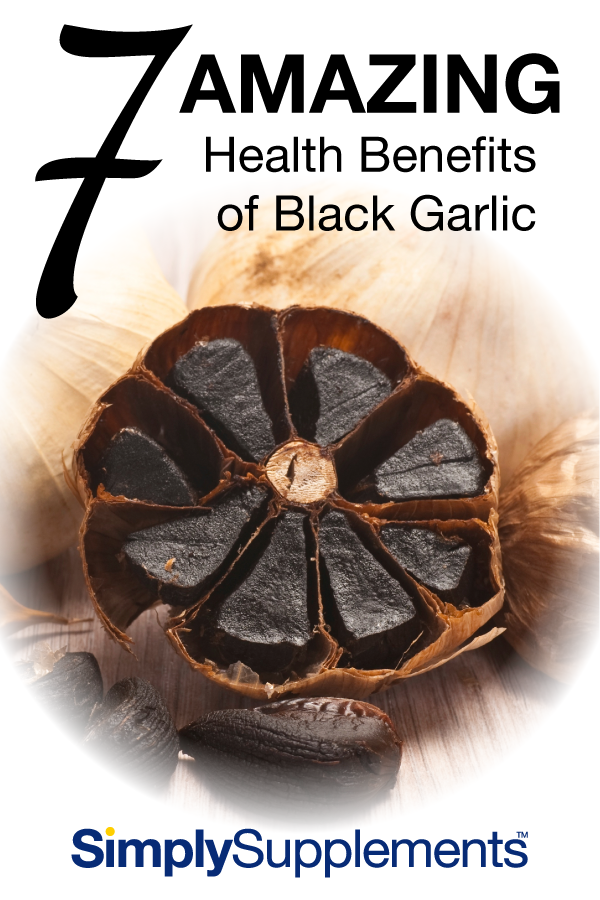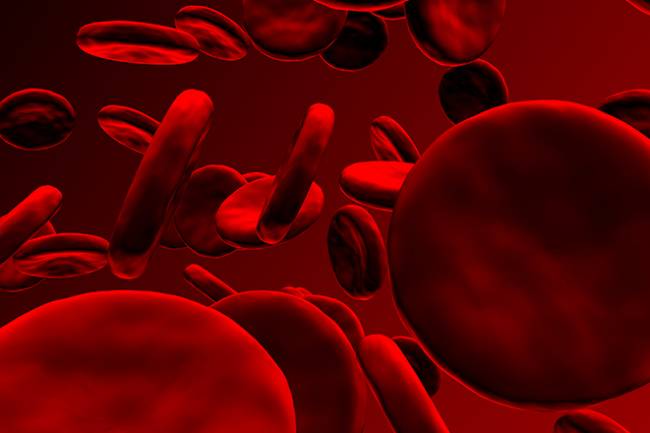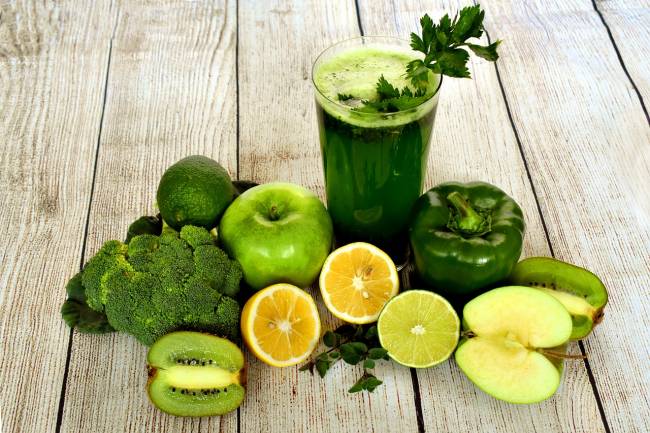The Health Benefits of Black Garlic

Black garlic has grown in popularity among chefs in recent years, as it offers a sweeter and gentler flavour than more traditional white garlic. Alongside the culinary interest in black garlic, however, there is also growing interest in the potential health benefits that it offers.
What is Black Garlic?
Black garlic is actually just traditional white garlic that has been put through a curing process. In essence fresh cloves of garlic are stored at high temperatures (typically 65-80'C) and humidities (70-80%) for some weeks. This curing process, known scientifically as the “Maillard Reaction”, turns the garlic black and changes its chemical nature.
Black garlic is renowned for its sweeter taste and a soft, jelly-like texture. For people who find traditional garlic too pungent, black garlic has an altogether subtler appeal. It also loses the strong flavour typical of fresh garlic, which some people may find preferable, and means it can be eaten cooked or even raw just as you might use white garlic.
What are the Health Benefits of Black Garlic?
The ageing process that turns white garlic into black garlic leads to a decrease in the compound allicin (which is responsible for garlic's unique odour) and an increase in other compounds such as water-soluble S-allylcysteine (SAC). SAC is a potent antioxidant, plus it is easily absorbed and less toxic than other compounds typically found in garlic. Many of the benefits of black garlic are based on SAC, which becomes the most abundant component following the ageing process.
Here are some of the key health benefits that black garlic seems to offer…
Reduced Cholesterol Levels
High cholesterol levels are part of modern life for many of us. Poor diets comprising of many high fat premade foods can boost levels of “bad” cholesterol, while a lack of exercise can further worsen the problem. Black garlic, however, seems to have a positive impact on cholesterol levels in the body.
In one study, sixty volunteers were either given black garlic or a placebo twice a day for 12 weeks. The researchers found that the group taking black garlic saw a significant increase in high-density lipoproteins (“good” cholesterol) and theorised that it may offer benefits to the cardiovascular system.
In another experiment, black garlic was provided alongside a high fat diet, to see whether it impacted the cholesterol levels in the blood. The findings largely mirror the previous study; good cholesterol levels rose, while bad cholesterol fell. Total cholesterol levels also fell in those being provided with the garlic extract.
One final piece of evidence comes from Korea, in which scientists tried to assess the potential benefits of black garlic on obesity sufferers. They too found that black garlic resulted in both reduced triglyceride levels and total cholesterol when compared to the control.
While it is still early days, the limited number of studies carried out so far suggest that black garlic may help to support healthy cholesterol levels in the body.
Boosts the Immune System
Garlic has been suggested to support the immune system through stimulating the white blood cells involved in the immune response. Garlic's role in catching a cold has also been investigated with some suggestion it may reduce the occurrence of colds, though more studies are needed to confirm this.
One study tried to compare the “immunostimulatory” abilities of white and black garlic. Healthy subjects consumed either of the two substances before having their blood drawn. The experts then assessed the impacts of the garlic extract on white blood cells. They found that black garlic extract “showed stronger immunostimulatory activities than raw garlic”. Furthermore, they claim that their results indicate a strong correlation between the activity of black garlic and “antioxidant and anticancer activities”.
Another group of scientists investigating how black garlic seems to boost the immune system found evidence that the action occurs by stimulating the so-called “Natural Killer” cells. These are a type of white blood cell which, according to the British Society for Immunology, are “best-known for killing virally infected cells, and detecting and controlling early signs of cancer”.
Lower Inflammatory Response
Inflammation is implicated in a range of different health complications, from rheumatoid arthritis to asthma, so any substance capable of reducing the inflammatory response is potentially exciting. A study in Korea investigating the anti-inflammatory effects of black garlic found enough evidence to suggest that it “could contribute to the prevention and improvement of inflammatory disease”.
Fights Bacterial Infection
Increasing interest in black garlic's potential health benefits have led to investigations of it's ability to control tumours. A study from Japan, however, made a rather startling discovery during one of their experiments. They found evidence that black garlic extract demonstrates antibacterial activity, specifically in response to so-called “medically relevant” pathogens such as MRSA and E.coli.
Provides Antioxidant Protection
Black garlic possesses a variety of antioxidant mechanisms which may inhibit damage involved in ageing and the development of various diseases. It has also been shown to increase glutathione levels, another antioxidant which serves a number of important purposes in the body. These antioxidant effects have shown promise for various health conditions in animal studies, including type 2 diabetes and liver health, but further studies involving humans are needed to confirm these benefits.
Supports a Healthy Heart
There has been much research looking into the effects of garlic on factors of heart health including cholesterol and blood pressure. For instance, a recent 12-week trial looked at the effects of aged garlic extract in individuals with high blood pressure. The researchers found the garlic supplementation to be effective and potentially useful alongside conventional medical treatments.
More research is needed to clarify the effects of garlic, especially as many studies have only been carried out using animals so far, but it looks promising as being a beneficial addition to a healthy diet.
Provides Plenty of Vitamins
One final analysis is worthy of mention here, in which scientists aimed to assess how the curing process affects vitamin levels. Water soluble vitamins are of particular interest because they cannot be stored in the body; as a result they must be regularly consumed in the diet if deficiencies are to be avoided. The experts found that the heat used to turn raw garlic into black garlic seems to concentrate the vitamins, finding that the “the total water-soluble vitamin content increased by about 1.15 to 1.92 times in black garlic than that in fresh garlic”.
Ready to Try Black Garlic?
Black garlic is a versatile ingredient so can be used in a range of meals to suit different tastes. You could start off by including it in a marinade to use for coating meat or vegetables or adding it into a soup or salad dressing. If you're looking for just the potential health benefits of black garlic then it is now available as a high quality supplement.

Sources:
http://www.tandfonline.com/doi/abs/10.3109/08923973.2011.649288
https://synapse.koreamed.org/search.php?where=aview&id=10.4162/nrp.2009.3.2.156&code=0161NRP&vmode=FULL
https://zenian.co.nz/wp-content/uploads/2014/05/Japanese-+-Chinese-research-on-black-garlic.pdf
https://pdfs.semanticscholar.org/9159/916f3d32a392f641532cb1b5b818a4c69614.pdf
http://www.academicjournals.org/journal/JMPR/article-abstract/E1EBBEA19050
http://onlinelibrary.wiley.com/doi/10.1111/j.1365-2621.2012.02957.x/full
http://www.sciencedirect.com/science/article/pii/S0899900714001191
http://www.koreascience.or.kr/article/ArticleFullRecord.jsp?cn=SPGHB5_2008_v40n4_443
https://link.springer.com/article/10.1007/s10068-013-0039-3
http://www.koreascience.or.kr/article/ArticleFullRecord.jsp?cn=SPOOBG_2014_v43n10_1527

 Nicole
Nicole 

























